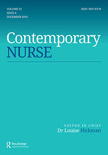
Contemporary Nurse
Scope & Guideline
Empowering the nursing community with cutting-edge insights.
Introduction
Aims and Scopes
- Nursing Education:
Focuses on innovative teaching strategies, curriculum development, and the educational experiences of nursing students, including their preparedness for clinical practice. - Clinical Practice Improvement:
Explores quality improvement initiatives, evidence-based practices, and the implementation of clinical guidelines to enhance patient care outcomes. - Workforce Issues:
Analyzes factors affecting nurse retention, job satisfaction, and the impact of workforce dynamics, including the challenges faced by internationally educated nurses. - Cultural Safety and Inclusivity:
Examines the significance of cultural safety in nursing practice, particularly in relation to Indigenous populations and diverse communities. - Mental Health and Wellbeing:
Investigates the mental health and wellbeing of nurses and patients, emphasizing the importance of supportive environments and interventions. - Health Policy and Leadership:
Discusses the implications of health policy on nursing practice, including leadership roles and advocacy for systemic changes in healthcare. - Technology Integration:
Looks at the role of technology in nursing practice, education, and patient care, including telehealth and digital health tools.
Trending and Emerging
- Mental Health and Wellbeing:
There is a notable increase in research focused on the mental health and wellbeing of both nurses and patients, highlighting the importance of supportive practices and environments in healthcare settings. - Cultural Safety:
Emerging studies emphasize cultural safety, particularly in relation to Indigenous health and the experiences of diverse populations, reflecting a growing recognition of the need for inclusivity in nursing. - Climate Change and Nursing:
An increasing number of articles address the role of nurses in responding to climate change, advocating for environmental health and sustainability as integral components of nursing practice. - Technology in Nursing Practice:
Research exploring the integration of technology, such as telehealth and electronic health records, is gaining momentum, indicating a shift towards modernizing nursing practice. - Workforce Dynamics:
There is a rising focus on workforce issues, including retention strategies, the impact of the COVID-19 pandemic on nursing, and the experiences of internationally educated nurses. - Patient-Centered Care:
The trend towards person-centered care is becoming more pronounced, with studies examining how to enhance patient engagement, dignity, and respect in nursing practice.
Declining or Waning
- Traditional Nursing Roles:
The exploration of conventional nursing roles has become less frequent, suggesting a shift towards advanced practice roles and interdisciplinary collaboration. - Pharmacological Interventions:
Research focusing specifically on pharmacological treatments in nursing has decreased, possibly indicating a broader interest in holistic and non-pharmacological approaches. - Aging Population Challenges:
While still relevant, the frequency of studies addressing the specific challenges faced by aging populations appears to be declining, potentially overshadowed by broader workforce and mental health concerns. - Basic Skills Training:
There seems to be a reduction in articles centered on basic skills training for nursing students, as the focus may have shifted to more complex competencies and critical thinking. - Competence Assessment Methods:
Discussions around competence assessment tools and methods have waned, possibly as the field moves towards more integrated and comprehensive evaluation strategies.
Similar Journals
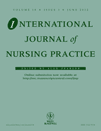
International Journal of Nursing Practice
Elevating nursing standards through rigorous peer-reviewed articles.International Journal of Nursing Practice, published by WILEY, is a premier academic journal dedicated to the field of nursing, with a keen emphasis on innovative nursing practices and advancements in healthcare. Established in 1995, the journal has successfully bridged a vital gap in nursing research and practice, featuring rigorous peer-reviewed articles that cater to both academic and clinical audiences. Rated as a Q1 journal in Nursing (miscellaneous) for 2023, it ranks at an impressive #29 out of 139 in General Nursing on Scopus, placing it firmly within the top 21% of its category. The journal serves as an essential resource for nursing professionals, researchers, and students alike, fostering evidence-based practices and enriching the global discourse in nursing. With an increasing focus on interdisciplinary work, the International Journal of Nursing Practice aims to enhance the quality of care provided to patients and support the continuous education of healthcare providers. Stay updated with cutting-edge research and share your contributions to this dynamic field!
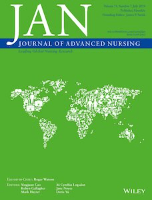
JOURNAL OF ADVANCED NURSING
Empowering nursing through innovative research and discourse.JOURNAL OF ADVANCED NURSING is a premier peer-reviewed journal published by Wiley, dedicated to advancing the field of nursing and contributing to the global dialogue surrounding nursing practices and education. With an impressive impact factor, this journal is positioned in the esteemed Q1 category for miscellaneous nursing journals in 2023, reflecting its rigorous standards and the high quality of published research. The journal covers a broad range of topics within nursing, promoting innovative research and critical discourse that informs best practices and policy decisions, making it an invaluable resource for researchers, practitioners, and students alike. With its foundational years dating back to 1976, the JOURNAL OF ADVANCED NURSING continues to uphold a legacy of excellence and impact, currently ranked #7 out of 139 in the Scopus General Nursing category, placing it in the top 95th percentile of nursing journals. Although primarily subscription-based, the journal provides access options that cater to institutions and emerging researchers, ensuring that vital knowledge is disseminated widely within the nursing community.
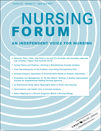
NURSING FORUM
Connecting Practitioners and Scholars in Nursing Advancement.NURSING FORUM, published by Wiley-Hindawi, is a premier journal dedicated to advancing the knowledge and practice of nursing across diverse contexts. With an ISSN of 0029-6473 and E-ISSN 1744-6198, this esteemed journal has been a vital source of scholarly communication since its inception in 1961, serving researchers, practitioners, and educators in the nursing field. Recognized for its impactful contributions, it holds a prestigious Q1 ranking in Nursing (miscellaneous) and ranks #18 out of 139 in Scopus' General Nursing category, placing it in the top 87th percentile of its field. With its publication continuity from 1961 to 2024, NURSING FORUM promotes innovative research, evidence-based practices, and critical discourse essential for the nursing profession. This journal not only provides access to cutting-edge studies but also fosters a collaborative platform for healthcare professionals and academics to engage and share insights. Whether you are a seasoned researcher or a nursing student, NURSING FORUM is your essential gateway to the latest advancements and discussions that shape the future of nursing.

Nursing Practice Today
Exploring New Frontiers in NursingNursing Practice Today is an esteemed journal published by Tehran University of Medical Sciences, focusing on the dynamic and essential field of nursing. Since its transition to Open Access in 2015, this journal has facilitated wider dissemination of knowledge, allowing researchers, professionals, and students alike to engage with pioneering studies and practical advancements in nursing care. With an impact factor that reflects its relevance within the academic community, it holds a Q3 ranking in the nursing (miscellaneous) category as of 2023, and ranks 77th out of 139 in general nursing according to Scopus, placing it within the 44th percentile for its field. Nursing Practice Today publishes high-quality research, reviews, and case studies that aim to elevate nursing practices and improve patient outcomes across a variety of healthcare settings. As a platform that champions the ongoing education and professional development of nursing specialists, this journal plays a pivotal role in shaping contemporary nursing practice and addressing emerging challenges in healthcare.
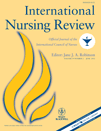
INTERNATIONAL NURSING REVIEW
Elevating Evidence-Based Practice in Nursing.Welcome to the INTERNATIONAL NURSING REVIEW, a premier journal dedicated to advancing the field of nursing through rigorous research and comprehensive analysis. Published by Wiley, this esteemed journal has been at the forefront of nursing scholarship since its inception in 1960 and continues to serve as a vital resource for healthcare professionals, researchers, and students alike. Boasting an impressive Q1 ranking in the miscellaneous nursing category and a prominent position as the 5th ranked journal in General Nursing according to Scopus, it represents the pinnacle of academic excellence with a 96th percentile in its field. Although it is not an open-access publication, the journal’s commitment to high-quality peer-reviewed content ensures that subscribers gain access to the latest advancements, evidence-based practices, and innovative approaches in nursing. With a global reach, the INTERNATIONAL NURSING REVIEW is an essential platform for disseminating research that informs clinical practice and shapes the future of nursing. Join the conversation and explore the breadth of knowledge available from this distinguished publication.
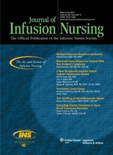
Journal of Infusion Nursing
Connecting practice and research in infusion therapy.Journal of Infusion Nursing, published by Lippincott Williams & Wilkins, stands as a vital resource within the fields of nursing and healthcare. With a strong focus on infusion practices and patient care, this journal is committed to disseminating high-quality research and evidence-based practices that enhance nursing protocols and improve patient outcomes. As a quarterly publication, it is indexed in Scopus, ranking 32nd out of 139 in the general nursing category, with a commendable 77th percentile, highlighting its influence and relevance in the nursing community. Operating without open access, the journal is dedicated to covering a spectrum of topics from emerging techniques in infusion therapy to comprehensive reviews that inform clinical practice, making it an essential read for researchers, practitioners, and students alike. The Journal of Infusion Nursing not only facilitates knowledge sharing but also plays a crucial role in advancing the standards of nursing care in the United States and beyond.
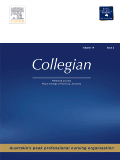
Collegian
Pioneering Research for a Dynamic Nursing Profession.Collegian is a distinguished academic journal published by Elsevier, focusing on the dynamic field of nursing. Launched in 1994 and continuing through to 2024, it aims to contribute to the advancement of nursing knowledge and practice. With an ISSN of 1322-7696 and an E-ISSN of 1876-7575, this journal has achieved an impressive standing, securing a Q2 category ranking within Nursing (miscellaneous) and positioning itself at #49/139 in the general nursing category on Scopus, with a commendable 65th percentile. The journal provides a platform for both established researchers and emerging scholars to share innovative research, case studies, and reviews that shape nursing education and practice. Although not open access, it remains widely recognized for its rigorous peer-review process and substantial contributions to nursing literature. As the profession evolves, Collegian stands out as a pivotal resource for professionals, educators, and students who seek to enhance their understanding and application of nursing science.
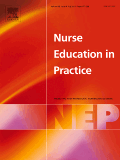
Nurse Education in Practice
Empowering educators to elevate nursing curricula.Nurse Education in Practice is a preeminent journal published by ELSEVIER SCI LTD that focuses on advancing the field of nursing education through rigorous research and innovative practice. With an impressive impact factor and positioned in Q1 in Education and Nursing, this journal serves as a vital resource for educators, researchers, and practitioners dedicated to enhancing nursing curricula and improving health outcomes. It ranks highly in both the Nursing and Social Sciences - Education categories, reflecting its influence and relevance in the academic community. By providing a platform for the exchange of knowledge and promoting evidence-based practices, Nurse Education in Practice plays a critical role in shaping the future of nursing education. The journal's commitment to fostering scholarly dialogue and improving nursing training ensures that it remains an essential read for those invested in the evolution of healthcare education.
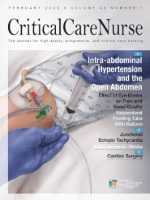
Critical Care Nurse
Empowering Critical Care Practitioners with Innovative InsightsCritical Care Nurse is a premier journal dedicated to advancing the field of critical care nursing, published by the American Association of Critical Care Nurses. With its consistent ranking in the Q1 category for Critical Care Nursing and impressive Scopus ranking at #8 out of 27, it serves as an essential resource for practitioners and researchers alike. The journal features innovative research, case studies, and reviews aimed at enhancing patient outcomes in critical care settings. As a significant contributor to nursing literature since 1980, Critical Care Nurse provides valuable insights and best practices that bridge the gap between theory and clinical practice, ensuring that professionals stay at the forefront of the ever-evolving healthcare landscape. While it is not an open-access journal, its high impact and relevance make it a critical read for those committed to excellence in critical care.

AMERICAN JOURNAL OF NURSING
Empowering Nursing Excellence Through Research.American Journal of Nursing, published by Lippincott Williams & Wilkins, stands as a pivotal resource in the nursing and medical communities since its inception in 1945. With an ISSN of 0002-936X and an E-ISSN of 1538-7488, this scholarly journal offers a forum for the latest research, clinical practice advancements, and discussions on contemporary nursing issues, contributing significantly to the body of knowledge in nursing and medicine. Although it currently lacks open access options, the journal is recognized for its rigorous peer-review process, maintaining a respectable impact factor within the nursing category, as reflected in its 2023 Scopus ranking (95/139). With an emphasis on sharing innovative practices and evidence-based findings, the American Journal of Nursing aims to inspire and equip nursing professionals, students, and researchers to enhance patient care outcomes and foster advancements in the field. Its commitment to quality and relevance ensures that it remains an essential touchstone for ongoing education and professional development in global nursing practice.